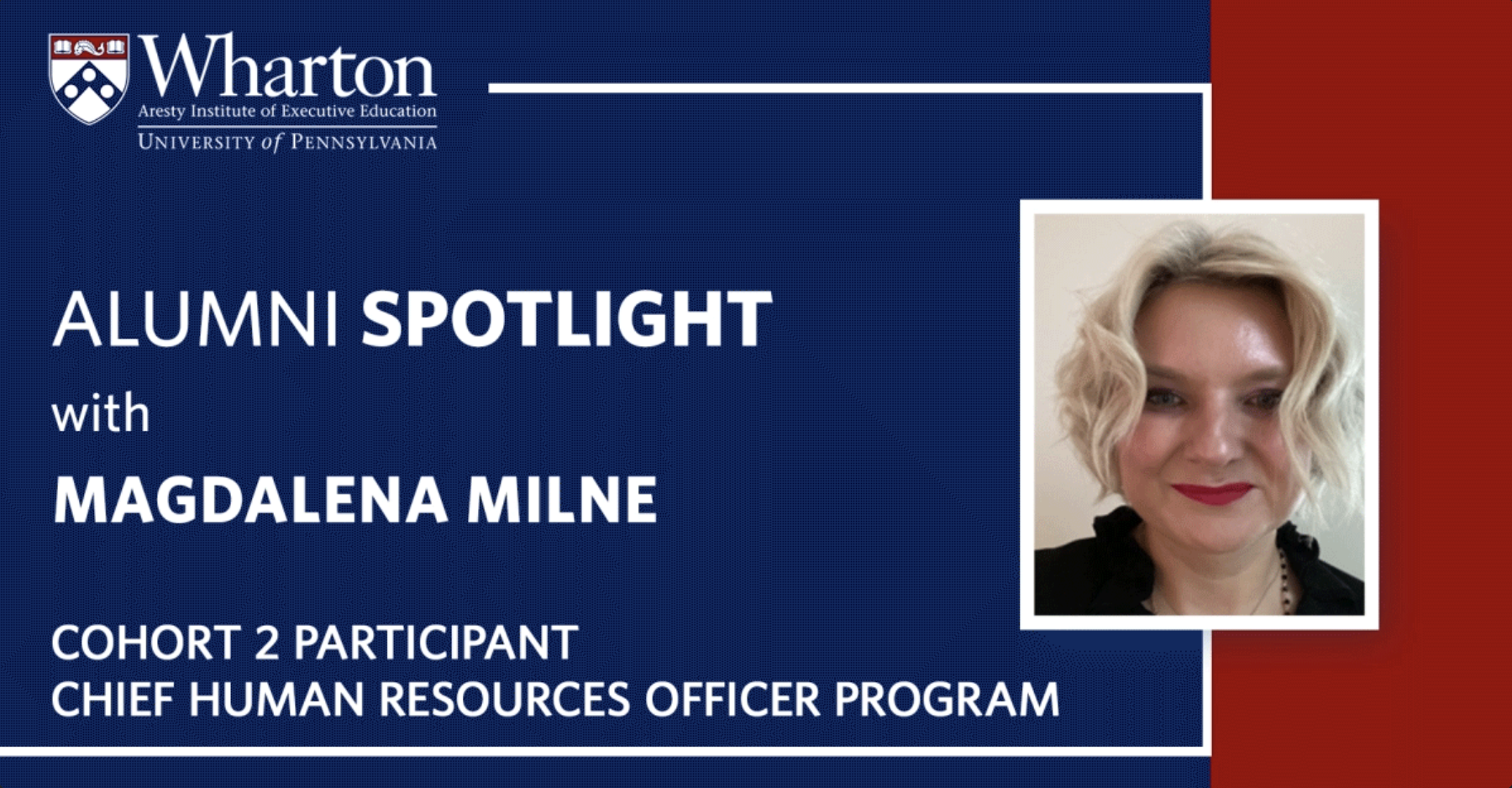How Magdalena Milne is Turning Her Passion for People into a Pivot to HR

Originally published by Wharton Executive Education. Program alumna in focus: Magdalena Milne
Based in the Chicago area, Magdalena Milne is a seasoned business leader who is driven by an entrepreneurial spirit. She thrives on building teams and problem-solving to turn challenges into opportunities.
Milne immigrated to the United States from Poland in 1997 during her college years and has spent most of her career in consulting client delivery roles, operations, and chief of staff roles. Over the course of her professional development, she discovered that what she loves more than anything is working with people — mentoring and training employees and discovering and nurturing talent. She’s also a strong believer in promoting diversity, equity, and inclusion. “Being a woman with an Eastern European background, I care deeply about inclusion and believe strongly in the power of teams with diverse perspectives and a rich culture,” Milne says.

Ready to make the pivot to an HR leadership role, Milne enrolled in Wharton Executive Education’s Chief Human Resources Officer (CHRO) Program. Through the program, she has gained key perspectives, insights, and frameworks to make the transition to a senior talent strategy role.
We sat down with Milne to explore her professional background and how the program is helping her as she prepares to take the next step in her career.
Please tell us about your education and career journey.
I was born in Poland and went to elementary and high school in the city of Gdansk, which is a historic city that was at the center of the Solidarity movement when I was growing up. It was a very interesting moment in history to see the end of communism and the beginning of the free market. I started my college education at the University of Gdansk, majoring in economics and studying sea commerce, a popular focus, given the city’s location on the Baltic coast and the prevalence of maritime trade. After three years, I decided to take a break before writing my thesis and went to visit my uncle, who lives in the United States. I originally planned to stay for three months, but one thing led to another, and I ended up transferring to Purdue University and changed my major to accounting. I got my first job at JPMorgan Chase (Heritage Bank One) in Chicago. It was an exciting time. Jamie Dimond was just appointed CEO, and I got to meet him. I was in a finance and accounting rotational program which gave me exposure to different areas. When Bank One merged with JP Morgan Chase and most of the corporate jobs moved to New York City, I decided that it was time to experience one of the Big 4 accounting firms, especially being a CPA. As luck would have it, KPMG reached out to me to see if I was interested in joining their Advisory practice.
How did you move from accounting into an operations role?
I got hired and worked on multiple Sarbanes-Oxley projects for large corporations in various industries including financial services, oil and gas, aerospace, and defense. Over time, we increasingly got into advising on transformation and process improvement projects for big Fortune 100 clients. One of the partners who I worked with was in the midst of creating a brand new business unit and asked me if I would be interested in helping build it. I had never done anything like that, but I’m always up for a new challenge. I worked with her first as a manager and then got promoted to director of operations and chief of staff.
We built it from the ground up, including developing offerings, marketing materials, planning and budgeting, and all aspects of talent strategy and management — everything you can think of when you are launching a small business within a larger company. We had our own P&L, communications and marketing, and a distinct perspective on the business. I ended up taking on a similar role of building a business within the business a couple of times at KPMG. The last instance was with our strategy group where I led operations and talent management. It was interesting because we started with a staff of only 50, and when I left, we had more than 500 people, plus a lot of different components. I was helping develop our MBA sponsorship program and our global rotational program. Coming from Poland, I love anything that is global and international, so I was always attracted to that aspect and was excited to work with people across the world.
Why did you decide to make the transition to HR?
Over my career, I discovered that I really love working with people and engaging and connecting with employees. Throughout my work, I have been deeply involved in training and developing training tools. In one of my last roles at KPMG, I worked under the HR umbrella in learning and development in charge of helping deploy training across the entire U.S. advisory practice, which numbers more than 10,000 people. I am proud of the work we did, and I came to realize that I’m very passionate about working with people, developing them, and finding their strengths.
As the pandemic spread, we had to revamp everything we did to deliver virtual live training experiences. It was challenging but exciting to think through how we would now connect with leaders and the community. We got really creative. We started Peloton rides and online yoga and meditation. We arranged town halls with leadership and held regular coffee chats. During that time, I realized that every time I worked with people, or I had difficult situations that I had to resolve that were related to people, that’s what I enjoyed the most. So, I decided that I really wanted to pivot to the HR world.
Why did you choose the CHRO Program?
I had tons of practical HR experience, but I only worked under the HR umbrella for a couple of years. While I wanted to pivot, I felt the need to obtain some additional credentials. I wasn’t interested in doing an extensive program that could take years, so I started searching for certificate programs. I looked at a number of programs and talked to lots of people. The CHRO Program looked like it fits me perfectly. I could still work while taking part in the program, and I really loved the global aspect of it. The international composition was also a real draw.
What was the program experience like for you?
I loved the program. I love reading and learning about ideas — articles in the Harvard Business Review or listening to podcasts about human psychology. This is my thing. So, what I really liked about the program is that there is a mix of live sessions and short videos built around fascinating topics. Everything is very digestible. I enjoyed the case studies and looking at real-world issues at many of the same companies that I worked with at KPMG; so it was all very relatable. The curriculum confirmed what I had learned from practical experience, but now I understood the research behind it. I also learned some great tech, tactical tools, and ideas I can bring into my next role.
What was the interaction like with faculty and peers?
The office hours were super valuable. I always joined them and enjoyed the exchange of experiences with people from around the world. I made great connections with executives from throughout the United States, UK, India, United Arab Emirates, and even Ukraine. We all connected on LinkedIn and continue to stay in touch. While I am familiar with how people work and approach business and HR in Europe, it was interesting to hear the perspectives of leaders from other regions, as well as their stories and struggles.
I related very well to my success coach and loved Professor Matthew Bidwell. His lectures and how he approached issues were impressive. All the faculty were great, and I was awed by their research.
What advice would you give to someone considering an executive education program like the CHRO Program?
This program is a great opportunity not only for HR executives who want to advance to a CHRO role but also for people like me who may sit within the business side but who do a lot of HR work. If you are a chief of staff or a director of operations — particularly in the area of professional services — this program would be very beneficial. You’ll learn tactical tools, why data is important, and how to harness the best data, rather than relying on intuition. For any business these days, people are the main asset. Given what’s happening in the workplace as a result of the pandemic, companies must start thinking about how they can value their professionals, and I think this program helps put the focus on what people value. It’s not just the money. We know from research that there are other things professionals are interested in achieving as part of their overall career goals. This program puts the spotlight on building a people strategy and why that’s so important.
What’s next for you?
I’m really excited about the next step in my career. Moving into a talent strategy or talent management role is where I am trying to go next. Finding the right place for people in an organization, seeing where their strengths are, and building out the right performance evaluation process are all things I’m passionate about.
For my entire career, I was a part of a big company, but I was fortunate enough to build something within the company and see how it grows and flourishes. I’d love to work in a smaller company where there is an entrepreneurial and innovative mindset, and I can have a leadership role in building out operations and/or people strategy. That’s my goal, and I’m excited about the future.
You can learn more about the Wharton Executive Education Chief Human Resources Officer (CHRO) Program by visiting our program homepage.

